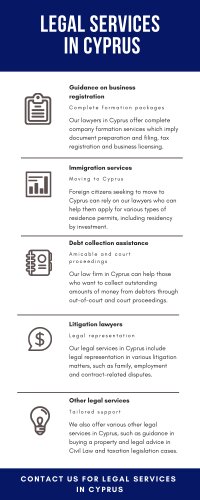Best Contract Lawyers in Larnaca
Share your needs with us, get contacted by law firms.
Free. Takes 2 min.
List of the best lawyers in Larnaca, Cyprus
Cyprus Contract Legal Questions answered by Lawyers
Browse our 1 legal question about Contract in Cyprus and read the lawyer answers, or ask your own questions for free.
- Obtain deeds
- I need to obtain my deeds, but my builder no longer trades under his name. How do I get these?
-
Lawyer answer by N. Connor LLC
If your builder is no longer trading, you can still get your deeds. Here’s what you can do: 1. Check with the Land Registry – The Department of Lands and Surveys can confirm if the title deeds have been issued....
Read full answer
About Contract Law in Larnaca, Cyprus:
Contract law in Larnaca, Cyprus, is primarily governed by the Cyprus Contract Law, Cap. 149, which is based heavily on English contract law principles. The law covers various aspects, including the formation, execution, and enforcement of contracts. Contracts are generally recognized as legally binding agreements between two or more parties, whether written or verbal, as long as there is an offer, acceptance, intention to create legal relations, and consideration.
Why You May Need a Lawyer:
There are several situations where you may require legal assistance with contracts in Larnaca:
- Drafting and Reviewing Contracts: To ensure clarity, fairness, and legality.
- Negotiating Terms: To achieve favorable terms and conditions.
- Disputes and Breach of Contract: When conflicts arise, legal guidance is crucial for resolution.
- Business Transactions: For mergers, acquisitions, and partnerships.
- Employment Contracts: To protect both employers and employees.
- Lease and Tenancy Agreements: For landlords and tenants to understand their rights and obligations.
Local Laws Overview:
Key aspects of local laws relevant to contracts in Larnaca include:
- Formation of Contract: Essential elements include offer, acceptance, intention, and consideration.
- Capacity: Parties must have the legal capacity to enter into a contract.
- Legality: The purpose of the contract must be legal; contracts involving illegal activities are void.
- Written vs. Oral Contracts: Both are generally enforceable, but certain types of contracts must be in writing (e.g., property transactions).
- Performance: Parties must fulfill their obligations as per the contract terms.
- Breach and Remedies: Remedies for breach include damages, specific performance, and injunctions.
- Termination: Contracts can be terminated by mutual agreement, performance, breach, or frustration.
Frequently Asked Questions:
1. What makes a contract legally binding in Cyprus?
A contract is legally binding in Cyprus if it involves an offer, acceptance, consideration, and the intention to create legal relations.
2. Do contracts have to be in writing to be enforceable?
No, oral contracts can also be enforceable. However, certain contracts, such as those related to the sale of property, must be in writing.
3. How can I terminate a contract?
Contracts can be terminated by mutual agreement, upon completion of the obligations (performance), if one party breaches the contract, or if unforeseen circumstances frustrate the contract's purpose.
4. What are the typical remedies for a breach of contract?
Remedies include damages (compensation), specific performance (court order to fulfill the contract), and injunctions (court orders preventing specific actions).
5. Can minors enter into contracts?
Minors (individuals under 18 years old) generally lack the capacity to enter into contracts, except for necessities or beneficial contracts of service.
6. What happens if one party was misled when entering into a contract?
If misrepresentation or fraud is proven, the innocent party may have grounds to void the contract and seek damages.
7. Are electronic signatures valid in Cyprus?
Yes, electronic signatures are generally recognized and enforceable under Cyprus law, provided certain conditions are met.
8. What is the statute of limitations for contract disputes in Cyprus?
The statute of limitations for contract disputes in Cyprus is generally six years from the date the cause of action arises.
9. Can employment contracts include restrictive covenants?
Yes, but they must be reasonable in scope and duration to be enforceable, protecting legitimate business interests.
10. How can I enforce a contract in Cyprus?
If a contract is breached, you may seek enforcement through the courts, which can grant remedies such as damages or specific performance.
Additional Resources:
Several resources can assist with contractual matters in Cyprus:
- Cyprus Bar Association: Offers a directory of licensed lawyers.
- Cyprus Chamber of Commerce and Industry: Provides information on business-related contracts.
- Ministry of Justice and Public Order: Contains legal resources and updates.
- Cyprus Consumer Protection Service: Offers guidance on consumer contracts and disputes.
Next Steps:
If you need legal assistance with contracts in Larnaca, consider the following steps:
- Identify Your Needs: Determine the specific area where you need legal help.
- Research Lawyers: Look for lawyers or law firms specializing in contract law in Larnaca.
- Consultations: Schedule consultations with potential lawyers to discuss your case and evaluate their expertise.
- Gather Documentation: Prepare all relevant documents and information related to your contract.
- Legal Representation: Select a lawyer who provides clear guidance and has a track record of handling similar cases successfully.
Seeking professional legal advice can significantly impact the successful resolution of your contractual matters, ensuring your rights and interests are protected.
Lawzana helps you find the best lawyers and law firms in Larnaca through a curated and pre-screened list of qualified legal professionals. Our platform offers rankings and detailed profiles of attorneys and law firms, allowing you to compare based on practice areas, including Contract, experience, and client feedback.
Each profile includes a description of the firm's areas of practice, client reviews, team members and partners, year of establishment, spoken languages, office locations, contact information, social media presence, and any published articles or resources. Most firms on our platform speak English and are experienced in both local and international legal matters.
Get a quote from top-rated law firms in Larnaca, Cyprus — quickly, securely, and without unnecessary hassle.
Disclaimer:
The information provided on this page is for general informational purposes only and does not constitute legal advice. While we strive to ensure the accuracy and relevance of the content, legal information may change over time, and interpretations of the law can vary. You should always consult with a qualified legal professional for advice specific to your situation.
We disclaim all liability for actions taken or not taken based on the content of this page. If you believe any information is incorrect or outdated, please contact us, and we will review and update it where appropriate.
















